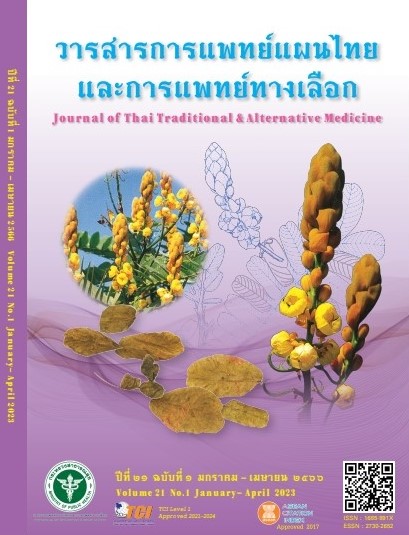The Development of Healthcare Model for End-stage Cancer Patients Using Thai Traditional Medicine and Herbs
Main Article Content
Abstract
The purpose of this study was to review, develop and evaluate the situation and effects of a healthcare model for end-stage cancer patients using Thai traditional medicine (TTM) and herbs. The holistic care concepts combined with research and development model were used as the conceptual and methodological framework. The study involved 30 purposively selected hospitalized patients with end-stage cancer, 30 primary caregivers of such patients, 24 TTM practitioners and 31 multidisciplinary team members at five model TTM hospitals. The study instruments included a tool for developing of a healthcare model and a tool for evaluating the outcome of model implementation. The tools were validated by five experts and their Cronbach’s alpha or reliability values were 0.79–0.86. Data were collected from September 2017 to May 2019 and descriptive statistics were used to analyze quantitative data, whereas content analysis was applied for qualitative data. The results revealed that the healthcare model for end-stage cancer patients using TTM and herbs had two components: (1) healthcare based on TTM’s natural method (tham-ma-na-mai) that focuses on healthy body (with herbs), healthy mind and healthy behaviors and (2) collaborative efforts of multidisciplinary healthcare providers in the phases of consultation, caring, discharge and home visits/follow-ups as well as family visits after the patient’s death. After implementing the model, the healthcare providers expressed a high feasibility level of the TTM-based end-stage liver cancer care model implementation and their satisfaction with the care was significantly higher than before (p = 0.05). Among
the patients, their symptoms after discharge were significantly better than before (p < 0.001); and their satisfaction level with the services of the multidisciplinary team was highest (Mean, 4.38; S.D., 0.46). The primary caregivers’ satisfaction was also highest (Mean, 4.22; S.D., 0.38). In summary, the study has demonstrated that the healthcare model for end-stage cancer patients using TTM and herbs makes the work of the healthcare team easier, resulting in a better coverage of patient care and improvements in the patients’ symptoms.
Article Details

This work is licensed under a Creative Commons Attribution-NonCommercial-NoDerivatives 4.0 International License.
References
Department of Medicine, Ministry of Public Health. National cancer control programme 2018-2022. Nontaburi: Ministry of Public Health; 2018. (in Thai)
Faculty of medicine Siriraj-hospital. The policy of caring cancer to reduce the incidence reduce disability and cancer deaths in Thailand [Internet]. 2019. [Cited 2021 August 10]; Available from: https://www.si.mahidol.ac.th/th/hotnewsdetail.asp?hn_id=2422 (in Thai)
Parisutkul A, Yeela A. Pain with cancer patients and to know the cancer with HOCC-PSU centre [Internet]. 2013.[Cited 2021 October 27]; Available from: http://hocc.medicine.psu.ac.th/files/annual_report/AR2556.pdf (in Thai)
Nilmanat K, Kongsuwan W. The phenomenon that often found in last state of life and caring. Songkla: Joyprint company; 2013. (in Thai)
Puangrassamee T. The development of caring cancer patients in last stage Sonklanakharin hospital. Bangkok: O.S. printing house; 2004. p. 35-40. (in Thai)
Chokevivat V. Policies and directions for the development of Thai traditional medicine and alternative medicine in Thailand.1st ed. Bangkok: The War Veterans Organization of Thailand Press; 2003. (in Thai)
Ventegodt S, Kande I. Health care for people with intellectual and developmental disabilities across the lifespan. Berlin: Springer International Publishing Switzerland; 2016. p.1935-41.
Wanchai A, Wiriyapramote P, Punjathumjarern N, Boonmee L. Health literacy of cancer patients using complementary and alternative medicine. Songklanagarind Journal of Nursing. 2019;39(1):149-57.
Borg WR, Gall. Educational research: An introduction. 4th ed. New York: NY Longman, Inc.; 1983.
World Health Organization. WHO definition of palliative care in national cancer control programs: policies and managerial guidelines. 2nd ed. Geneva; 2002.
World Health Organization. WHO Traditional Medicine Strategy: 2014-2023. Geneva; 2013. 12. Wang L, Suo S, Li J, Hu Y, Li P, Wang Y, Hu H. An investigation into traditional Chinese medicine hospitals in China: development trend and medical service innovation. Int J Health Policy Manag. 2017;6(1):19–25.
Wang BR, Choi IY, Kim KJ, Kwon YD. Use of traditional Korean medicine by patients with musculoskeletal disorders. PLoS ONE. 2013;8(5):e63209.
Lee SI, Khang YH, Lee MS, Kang W. Knowledge of, attitudes toward, and experience of complementary and alternative medicine in Western medicine and oriental medicine-trained physicians in Korea. Am J Public Health. 2002;92(12):1994–2000.
Basavareddy A, Lella M, Narayana S. Doctors’ perception on integrated medicine: A survey. J Basic Clin Pharm. 2017;8(2):62–5.
Sewitch MJ, Cepoiu M, Rigillo N, Sproule D. A literature review of health care professional attitudes toward complementary and alternative medicine. Complement Health Pract Rev. 2008;13(3):139–54.
McQuade JL, Meng Z, Chen Z, Wei Q, Zhang Y, Bei W,Palmer JL, Cohen L. Utilization of and attitudes towards traditional Chinese medicine therapies in a Chinese cancer hospital: A survey of patients and physicians. Evid Based Complement Alternat Med. 2012;2012:1-11.
Kummalue T. Difficulties of drug development from Thai herbal medicine. Pharm Anal Acta. 2012;S15(1):10.4172/2153-2435.S15-002.
Chotchoungchatchai S, Saralamp P, Jenjittikul T, Pornsiripongse S, Prathanturarug S. Medicinal plants used with Thai Traditional Medicine in modern healthcare services: A case study in Kabchoeng Hospital, Surin Province, Thailand. J Ethnopharmacol. 2012;141(1):193–205. (in Thai)
Fakkham S, Sirithanawutichi T, Jarupoonpol V, Homjumpa P, Bunalesnirunltr M. The integration of the applied Thai traditional medicine into hospitals of the current health delivery system: the development of an administrative/management model. J Med Assoc Thai. 2012;95(2):257–63. (in Thai)
Howe E, Keiwkarnka B, Khan MI. Traditional medicine and medicinal plants: Utilization, policy and research in Thailand. J Pub Health Dev. 2004;2(1):101–17. (in Thai)
Vadhnapijyakul A, Suttipanta N. The myth of policy on Thai traditional medicine’s promotion in state hospital. The 6th Annual Northeast Pharmacy Research Conference of 2014. Faculty of Pharmaceutical Sciences, Ubonratchathani University, Thailand; 2014. (in Thai)
Sundstrom E, DeMeuse KP, Futrell D. Work teams: Applications and effectiveness. American Psychologist. 1990;45:120-33.
Pilaikiat R, Rittharomya J, Bootchan T. Spiritual care for chronic illness patients: Experiences of professional nurses. Thai Journal of Nursing Council. 2009;24(1):62-76. (in Thai)


